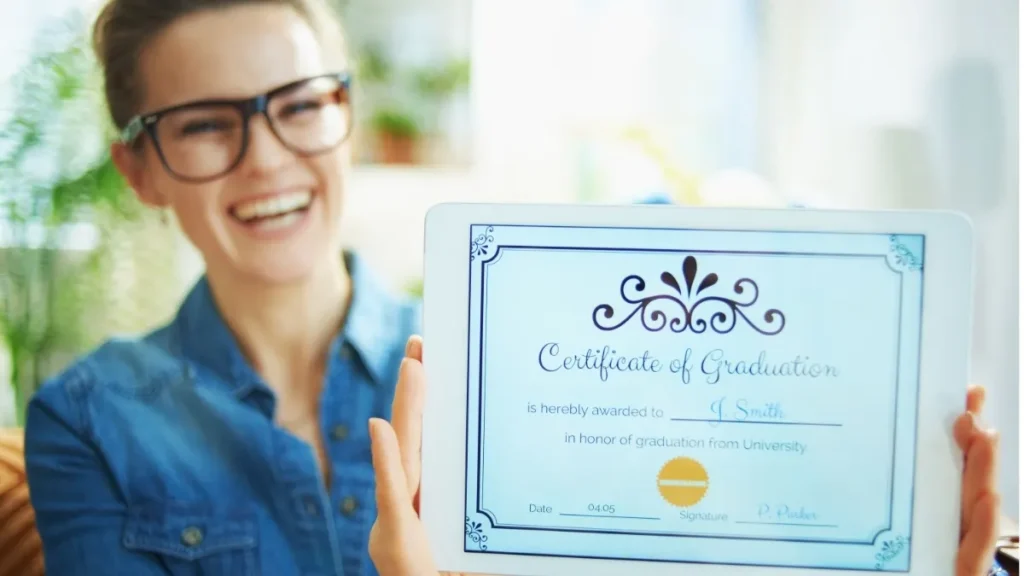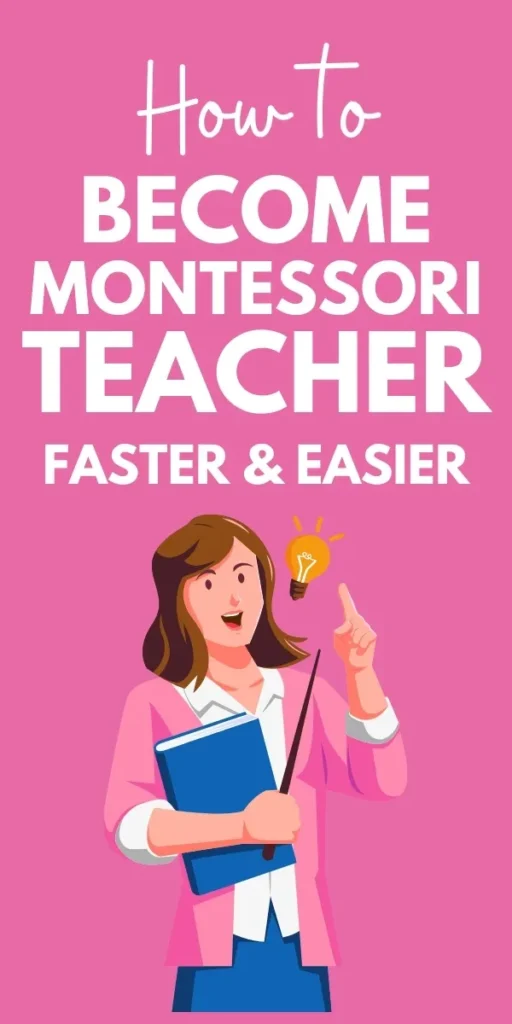The rhythmic hum of children exploring, the soft clatter of manipulatives, the spark of curiosity in young eyes – these are the sights and sounds that draw many towards the captivating world of Montessori education.
If you find yourself yearning to guide children along this unique learning path, the question likely lingers: how to become Montessori teacher?
How to Become Montessori Teacher? (A Quick Overview)
In order to become Montessori teacher and get a Montessori license you need to take the following steps:
- Obtaining necessary education: Firstly, you must Obtain a high school diploma or equivalent. Then you’ll need to Pursue a Montessori teacher training program accredited by organizations such as AMI or AMS.
- Get the right training: You will then need to complete Montessori teacher training courses, which cover philosophy, curriculum, and classroom management so you are able to apply the Montessori method while teaching.
- Get certified and obtain your credentials: Thirdly, you’ll need to earn the appropriate Montessori teaching credentials, such as an AMI or AMS certification.
- Gain the necessary experience: Gaining practical experience through internships or student teaching in Montessori classrooms is crucial on your path to becoming a Montessori teacher.
- Get your license: You’ll need to do some digging around and research state requirements, as some regions may require additional certifications or licenses.
- Job search: Search for job openings in Montessori schools, preschools, or elementary schools you can apply to become an assistant teacher if there’s nothing available to get your foot in the door.
- Professional development: One of the most important of being a Montessori teacher is constantly developing your skills and Staying updated with Montessori practices through workshops and continued education.
Becoming a Montessori teacher involves dedication, training, and a passion for fostering children’s holistic development through the Montessori philosophy.

Unveiling the Landscape:
Montessori teacher education can take various forms, each with its own strengths and demands. Here’s a brief overview of the main pathways:
1. Montessori Diploma Programs:
- Full-time immersion: Intensive programs lasting one to two years, offering comprehensive coursework, practicum experiences, and certification upon completion.
- Flexible options: Some programs cater to working professionals through evening or weekend formats, extending the timeframe but still delivering the necessary training.
- Accreditation matters: Choose programs accredited by respected Montessori organizations like the Montessori Accreditation Council for Teacher Education (MACTE) or the North American Montessori Teachers’ Association (NAMTA).
2. Master’s Degree Programs with a Montessori Focus:
- Advanced learning: Earn a Master’s degree while integrating Montessori pedagogy into your coursework.
- Dual certification: Many programs offer concurrent certification as a Montessori teacher, saving time and effort.
- Explore options: Universities often offer different emphasis areas within their Montessori programs, allowing you to tailor your education to your interests.
3. Additional Credentials:
- Early Childhood Education (ECE) certificates: While not a substitute for Montessori training, an ECE certificate can provide a foundational understanding of child development.
- Specialized endorsements: Some states offer Montessori endorsements to existing teaching licenses, expanding your career opportunities.
Choosing the Right Path:
- Self-reflection: Consider your learning style, budget, and timeline. Full-time immersion might be ideal for some, while others thrive in a part-time program.
- Research programs: Compare curriculum, accreditation, faculty expertise, and alumni testimonials to find a program that aligns with your values and learning goals.
- Seek guidance: Connect with existing Montessori teachers, program directors, or admissions advisors for firsthand insights and personalized recommendations.
Beyond the Diploma: Essential Qualifications:

1. Educational Background:
- Most programs require a bachelor’s degree in any field. Some may specifically prefer degrees in education, child development, or related areas.
- Strong academic performance and demonstrably high school math and English skills are often prerequisites.
2. Personal Qualities:
- Passion for learning: A genuine love for children and a thirst for knowledge about child development are key drivers for success in this field.
- Patience and empathy: Montessori education requires nurturing an environment of respect and understanding, allowing children to learn at their own pace.
- Strong communication skills: Effective communication with children, parents, and colleagues is essential for building trust and fostering collaboration.
- Organizational skills: Balancing daily classroom routines, student assessments, and documentation requires a sharp sense of organization and time management.
Investing in Your Future:
Financial Considerations:
- Tuition fees: Montessori teacher education programs can be expensive, with diploma programs ranging from tens of thousands to over a hundred thousand dollars.
- Scholarships and grants: Explore funding options offered by Montessori organizations, universities, or your local community.
- Career outlook: Consider the potential salary range for Montessori teachers in your location, balancing passion with financial planning.
Preparing for the Journey:
- Shadow a Montessori teacher: Observe a classroom in action to gain firsthand experience of the Montessori environment and its dynamics.
- Volunteer or work with children: Experience working with children in any setting can strengthen your child development skills and build confidence.
- Talk to Montessori graduates: Seek valuable insights and advice from existing teachers about their personal journeys and the realities of the profession.
Embracing the Challenge, Reaping the Rewards:
Becoming a Montessori teacher is not merely a career; it’s a calling. It demands dedication, perseverance, and a deep commitment to the principles of this transformative educational approach.
However, the rewards are beyond measure. Witnessing the magic of individual learning unfold, guiding young minds to independence and a love for exploration, and contributing to the development of well-rounded, confident individuals – these are the true treasures that await a passionate Montessori educator.
This guide provides a comprehensive overview of the path to becoming a Montessori teacher, from understanding the different education pathways to exploring essential qualifications and financial considerations.
It concludes with a powerful message about the intrinsic rewards of this demanding yet fulfilling profession. Remember, I can further refine this content by focusing on specific regional considerations or adding testimonials from experienced Montessori teachers to bring the journey to life for your readers.
Also Read:
- Is Guidepost Montessori Accredited? (A Quick Answer)
- Is Pre-K Free?
- Are Montessori Schools Non Profit? (A Closer Look)
- Are Montessori Fees Tax Deductible? (A Comprehensive Overview)
- How Much Are Montessori Schools Cost? (A Quick Answer)
